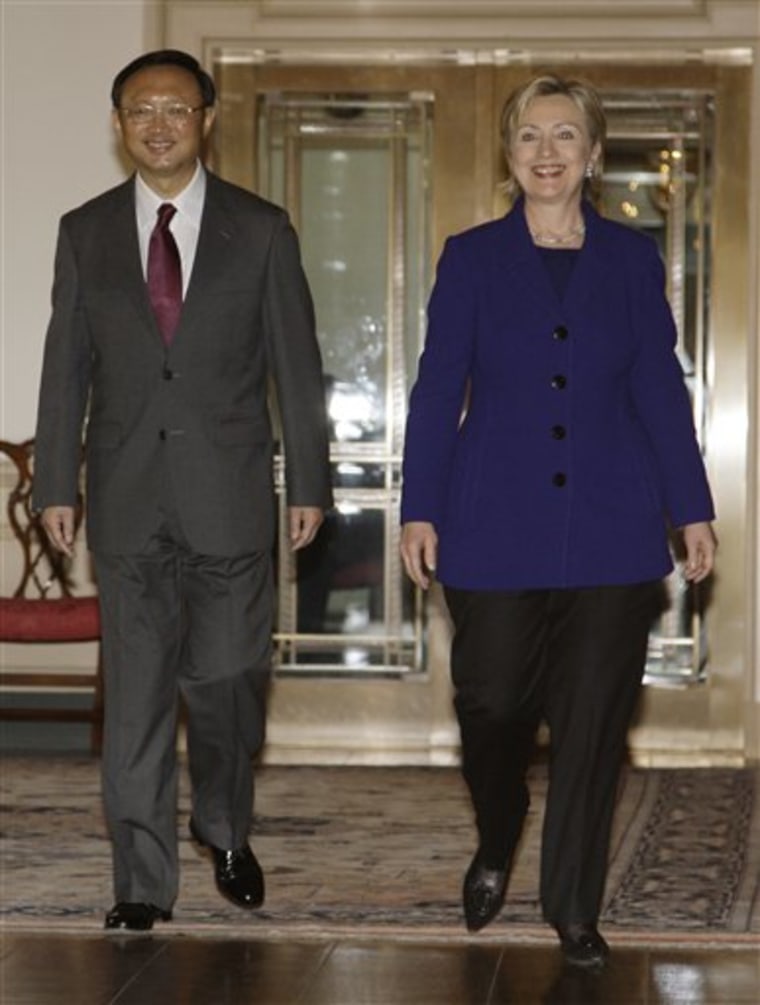The United States and China looked to ease tensions over a confrontation between American and Chinese vessels in the South China Sea as Secretary of State Hillary Clinton met Wednesday with her Chinese counterpart.
Before their private meeting, neither Clinton nor Chinese Foreign Minister Yang Jiechi mentioned the countries' dispute, even as China's Foreign Ministry in Beijing fired back for a second consecutive day at U.S. complaints that Chinese vessels harassed a U.S. Navy mapping ship in international waters on Sunday.
Clinton told reporters that Yang's visit to the State Department was a "very positive" development, and she looked forward to continuing discussions she had with Yang during her well-received trip to Beijing last month.
Yang said, "We are here to get prepared for our two heads of state meeting in London and to work together to push our relationship forward," referring to a crucial early April meeting in London between President Barack Obama and Chinese President Hu Jintao.
The South China Sea incident, however, would be very likely to come up in private talks, State Department spokesman Robert Wood told reporters before the meeting.
"From time to time, there are going to be elements that come up that cause some tension," Wood said. "But the most important thing is that the U.S. and China need to work together to solve a whole host of issues that the international community confronts."
'Face to face dialogue'
Defense Department press secretary Geoff Morrell told a Pentagon news conference that the United States hopes that "face-to-face dialogue in Beijing and in Washington will go a long way to clearing up any misunderstanding about this incident."
Even if diplomatic efforts by Clinton and Yang are successful in toning down the dispute, however, it may be only a temporary lull in a larger military disagreement.
Beijing has long complained about U.S. surveillance operations around China's borders. Without better communications between the two militaries as they operate in the South China Sea, the possibility for future conflict will remain.
Clinton and Yang "can have a productive exchange to keep this bounded, but the real bureaucracies that need to be there aren't going to be at the meeting," said Jonathan Pollack, professor of Asian studies at the U.S. Naval War College.
He suggested that without stronger military-to-military links, the potential for "something ugly" happening "should not be minimized."
On Wednesday, China's Foreign Ministry in Beijing reiterated that the U.S. claims are "gravely in contravention of the facts and unacceptable to China." Beijing says the U.S. ship was operating illegally in China's exclusive economic zone.
U.S. defense officials said Tuesday that the Navy ship was looking for threats such as submarines, presumably Chinese. The officials spoke on condition of anonymity because details of the ship's exact capabilities are sensitive information. Other U.S. officials have said publicly that the United States will continue to patrol in the South China Sea despite Chinese objections.
Serious incident
U.S. National Intelligence Director Dennis Blair told lawmakers Tuesday that the incident was the most serious episode between the two nations since 2001, when China forced the landing of a U.S. spy plane and seized the crew.
Yang also was scheduled to meet with U.S. Treasury Secretary Timothy Geithner and with White House officials, the State Department said.
The rising tension comes as the Obama administration tries to get Chinese help on a host of foreign policy matters, including efforts to confront Iran and North Korea over their nuclear programs.
